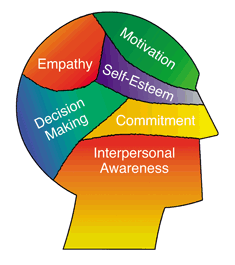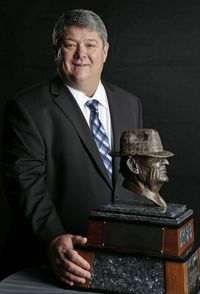Think of this as Volume 18, Number 6 of the newsletter I have written weekly since March, 1997. Enjoy.
 The industrial era was marked by shortages, and the need for technical expertise to overcome those shortages.
The industrial era was marked by shortages, and the need for technical expertise to overcome those shortages.
That expertise came in many forms. There was political and economic expertise, there was engineering and scientific expertise. A host of new professions grew up around this expertise. The world that these people built was defined by this kind of knowledge, turned to science, then through engineering transformed into technology.
The Internet Era has flipped all this on its head. You don't necessarily need to know stuff when you can Google it. The job of building knowledge, which was once about brute force, is now more about building connections, both among facts and among the people with access to those facts.
This is why the center of economic life has shifted in the 21st century. Power that resided in factories early in the 20th century, then moved to offices later in the century, now resides on university campuses.
 A campus is a different economic environment than an office. While outsiders may see it as regimented by time, with classes on set schedules, it's really not like that at all. A properly functioning research campus is filled with serrendipity. People may communicate in all sorts of ways – via e-mail, file transfers, in formal meetings. But some of the most important breakthroughs occur over coffee, or in the shower.
A campus is a different economic environment than an office. While outsiders may see it as regimented by time, with classes on set schedules, it's really not like that at all. A properly functioning research campus is filled with serrendipity. People may communicate in all sorts of ways – via e-mail, file transfers, in formal meetings. But some of the most important breakthroughs occur over coffee, or in the shower.
There's no such thing as a nine-to-five schedule in a research setting. You're always on the clock, you're seldom involved in formal work, but communication and collaboration are at the heart of everything. A research campus naturally creates density, not just workplace density but living density. Even if your campus is in a relatively small town, people live close together. They need one another.
An economy based around research campuses is more urban than an economy based around office work. You can get away from office work. It occurs on a set schedule. You don't want to get away from research, unless it's well away, and then you do it for some time, totally decompressing. When you take a break it's a complete break. Otherwise it's all-consuming.
 Folks like Richard Florida have done extensive studies about what this means in terms of urban development, economics and politics. But there are more important impacts, in terms of leadership, organization, and the kind of intelligence we should value, that emerge from it.
Folks like Richard Florida have done extensive studies about what this means in terms of urban development, economics and politics. But there are more important impacts, in terms of leadership, organization, and the kind of intelligence we should value, that emerge from it.
An office may work well with a top-down hierarchy. The work is structured, it's easy to measure, and so middle management develops to structure and manage it.
A university system, in the Internet era, is completely different. The work is unstructured. It's not easy to manage. Computers do the job of middle management.
Leadership, in a university setting takes something different from what is needed in an office setting. It takes emotional intelligence. You have to understand the personalities you're dealing with, you have to treat each person differently.
Coaching is seen as a very masculine thing to do, but it's actually very feminine. Knowing which buttons to push, knowing when to back off, handling the natural disputes that occur between people, getting everyone together, motivated, and performing at optimal capacity. All these things require emotional intelligence.
Emotional intelligence has been undervalued for centuries. That's why it's considered a woman's place. But in the Internet age it counts for more than it did in the industrial age. That's the reason women are finally rising to the top in so many fields. Women have pursued emotional intelligence as the path of least resistance and now it's the kind of knowledge that is in shortest supply.
Personally, I don't have much emotional intelligence. I have the old-fashioned kind, a lot of book learning. I have a hunger for knowledge, on a wide range of topics, and I apply what I know for insight into the world around me.
But leadership? Don't have that. Even self-knowledge has been hard to come by. In emotional terms I'm dyslexic. That's not just my ADHD talking – it's the story of my life.
 Of all those in my current family, it's my daughter who has the largest supply of this emotional intelligence. She knows her own mind, she can interpret the minds of others. She tends to think she is not very bright, but her specialty is the kind of intelligence we need more of today, emotional intelligence. She is the wisest among us, whether she believes it or not.
Of all those in my current family, it's my daughter who has the largest supply of this emotional intelligence. She knows her own mind, she can interpret the minds of others. She tends to think she is not very bright, but her specialty is the kind of intelligence we need more of today, emotional intelligence. She is the wisest among us, whether she believes it or not.
Your job, as a parent, should be nurturing this kind of intelligence, because in this century it will prove more valuable, in every way, than mere book learning.
The field of emotional intelligence, theories for gaining it, ways for applying it, and methods for maximizing its value to groups of people, needs a lot more study, both theoretical and practical.
We've usually approached it through psychology, which is mistakenly called “mental health.”
Psychology isn't about “mental” health at all – it's about emotional health. It's about self-knowledge, an understanding of personal strengths and weaknesses. And it's about interacting with others, about getting along.
Economically, emotional intelligence is traditionally undervalued. This needs to change, because it's in short supply when compared with intellectualism. It's emotional intelligence we need more of, in order to get the most out of our personal lives, our family lives, our communities, and (most important for the economy) a research setting.
 How do we develop it? How do we value it? How do we teach it, and inculcate it in our curricula? This may be one of the most important studies of our time, because it's the ability to organize people with different levels of emotional intelligence, and to coach them toward goals, that will determine how quickly we make breakthroughs, how well we organize our businesses, and whether we can meet the enormous challenges involved in saving the world from man's destructive impact.
How do we develop it? How do we value it? How do we teach it, and inculcate it in our curricula? This may be one of the most important studies of our time, because it's the ability to organize people with different levels of emotional intelligence, and to coach them toward goals, that will determine how quickly we make breakthroughs, how well we organize our businesses, and whether we can meet the enormous challenges involved in saving the world from man's destructive impact.
Politically I think that's what is driving the western move to the left. Those with intellectual heft have all the assets, and define their value. Only by moving more of those assets toward people, and toward the development of a society emotional intelligence, can we maximize economic growth in the Internet Age.
I can't give you specifics because, as I said, I lack the necessary emotional intelligence. I'm a lone thinker, and while I can be part of your team, I have to be integrated into it by others to be of much use, or placed aside as a resource.
Others have to do this work. This is a key job of the next generation. My point is only that this work is necessary. If you want to build this nation's economic competitiveness, and you're not a brilliant scientist, engineer, or coder, this is the kind of work we need you to do. You may not think you're that smart, but if you know your own mind, then you're just the person to do it.











hey dana. interesting post. i’m a male yoga teacher and have spent countless hours in meditation practice, getting to know my ‘self’ quite well. it’s refreshing to hear your positivity in this regard, and the point you make about ‘knowing your own mind’ to know someone’s else’s, is quite true. Men in the West are slowly emerging from centuries of patriarchal role-modeling, where callousness to women’s rights and anyone socially beneath you was the norm. At the heart of all of it is the ethos of equality which the US has at its core. It’s been slow in fruition, and there is more to go, but ‘a change is gonna come’… one day at a time.
hey dana. interesting post. i’m a male yoga teacher and have spent countless hours in meditation practice, getting to know my ‘self’ quite well. it’s refreshing to hear your positivity in this regard, and the point you make about ‘knowing your own mind’ to know someone’s else’s, is quite true. Men in the West are slowly emerging from centuries of patriarchal role-modeling, where callousness to women’s rights and anyone socially beneath you was the norm. At the heart of all of it is the ethos of equality which the US has at its core. It’s been slow in fruition, and there is more to go, but ‘a change is gonna come’… one day at a time.
Greg: My wife and I have shared a weekly yoga practice for a few years now. I have found nothing better for mind and body. Keep up the great work.
Greg: My wife and I have shared a weekly yoga practice for a few years now. I have found nothing better for mind and body. Keep up the great work.